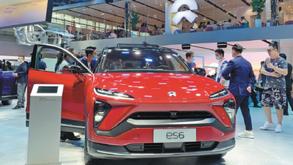 Chinese new energy vehicle manufacturer Nio showcases its product lineup and cutting-edge technologies at the 2020 Beijing auto show. (ZHANG DANDAN / CHINA DAILY)
Chinese new energy vehicle manufacturer Nio showcases its product lineup and cutting-edge technologies at the 2020 Beijing auto show. (ZHANG DANDAN / CHINA DAILY)
BEIJING/SHANGHAI - China’s rebounding vehicle sales are expected to total 25 million this year, narrowing the gap with last year to 2 percent, while in 2021, the upward trajectory will continue, with the market expected to grow to 30 million in five years, the country's top auto industry body said on Friday.
READ MORE: China's car sales go from strength to strength as virus eases
As the world's biggest vehicle market, China continues to lead the global auto industry in recovering from the COVID-19 pandemic.
The nation's automobile sector also was hit hard early this year. The first monthly sales growth did not come until April. But the growth has been in double digits since May, according to the China Association of Automobile Manufacturers.
"The recovery has turned out to be much better than expected," said Fu Bingfeng, the association's executive vice-president.
New energy vehicles are expected to see record high sales this year. Deliveries in November totaled nearly 200,000 vehicles, more than double the figure in the same month of 2019
Statistics from the group show sales in the first 11 months totaled 22.47 million, a 2.9 percent dip from 2019. It had forecast an annual decline of 15 percent to 25 percent when the pandemic was at its peak in China.
New energy vehicles are expected to see record high sales this year. Deliveries in November totaled nearly 200,000 vehicles, more than double the figure in the same month of 2019. The association said total deliveries would reach 1.3 million in 2020, up 8 percent year-on-year.
"China's fast and effective control of the pandemic helped restore consumers' confidence, which is crucial for big-ticket items like cars," said Thomas Fang, vice-president of consulting firm Roland Berger's China office.
This is seen in the popularity of premium vehicles. More than 300,000 were sold last month, up 31.8 percent year-on-year, according to the manufacturers' association. The segment's growth rate has been around 30 percent since April.
Fang said the government has been quick to promulgate such measures as relaxing license restrictions in big cities and extending subsidies to 2022 that were scheduled to expire in 2020, helping to boost sales.
Since the beginning of the year, central and local authorities have rolled out a series of measures to facilitate vehicle sales, including a campaign to sell electric cars and plug-in hybrids in rural areas.
Statistics from the Ministry of Industry and Information Technology show that around 180,000 vehicles have been sold since the campaign started in July, accounting for 16 percent of the country's total sales from January to November.
On Thursday, Gao Feng, spokesman of the Ministry of Commerce, said that it will work with other ministries and local governments to ease new car purchases, remove restrictions on secondhand vehicles and develop car rental and other car-related markets.
With the global auto industry hard hit by the pandemic, China has become increasingly important for international carmakers such as Germany's Volkswagen AG and General Motors Co of the United States.
ALSO READ: Pandemic speeds up change in country's auto market
Globally, the German company sold 6.5 million vehicles in the first nine months of the year, and China represented more than 40 percent of its sales.
Already the most popular gasoline-powered vehicle maker in the country, Volkswagen is increasing investment in the new energy vehicle segment.
It said on Tuesday it will build a $3 billion electric car plant with Chinese carmaker JAC Motors in the country. Volkswagen has set a goal of selling 1.5 million new energy vehicles annually in 2025 in China.


